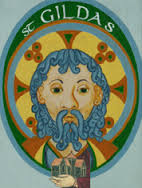
 St Gildas is best known for his historical work ‘De excidio Britanniae’, (“On the Ruin of Britain”) and for a Penitential, both of which were widely used in Ireland, Wales and England. He had contact with Irish monks and settled for the last part of his life on an island off Brittany, near which there is a town called after him, St Gildas de Rhuys.
St Gildas is best known for his historical work ‘De excidio Britanniae’, (“On the Ruin of Britain”) and for a Penitential, both of which were widely used in Ireland, Wales and England. He had contact with Irish monks and settled for the last part of his life on an island off Brittany, near which there is a town called after him, St Gildas de Rhuys.
Patrick Duffy tells us what is known about him.
A monk at the island of Flatholm in the British Channel
Gildas is said to have been born in the Clwyd valley in north Wales around 500 AD. He studied under St Illtud at Llaniltud Fawr in South Wales and perhaps in Gaul. He then settled as a hermit on the island of Flatholm (Welsh Ynys Echni) off Glamorgan in the Bristol Channel. He may have had some Irish saints among his own disciples there, including Finnian of Clonard, and probably visited Ireland himself.
Gildas’ History
Gildas wrote a well-known history called De excidio Britanniae (“The Ruin of Britain”), in which he looks back with longing to the age when the Roman legions kept order in Britain and blames the decadence of the secular rulers and clerics of his time on the disruption caused by the Anglo-Saxon invasions. He seems to have had a good Roman-style education: his Latin is elegant, though a bit long-winded and his work shows a good knowledge of Scripture, Virgil and the Letters of St Ignatius of Antioch. Because of his learning and literary style he is sometimes known as Gildas sapiens (Gildas the Wise). The work is a major source for events in Britain in his time and is cited by Bede in his Ecclesiastical History of the English People.
 To Brittany
To Brittany
Later, perhaps during the Yellow Pestilence (547), Gildas went to Brittany. He settled as a hermit on an island in the Gulf of Morbihan just inside Quiberon Bay, gathered some disciples there, and founded a monastery. He probably died there around the year 570. The island is still known as the Ile des Moines. And there is also a town nearby called St Gildas de Rhuys.
Penitential
Gildas also wrote a Penitential, from which we can infer that the monasteries of his day had their problems: sexual sins, drunkenness, stealing, disrespect of the consecrated bread and wine, laziness and disobedience of the abbot’s orders are all listed, though the penalties are notably milder than those of the Irish Penitentials.
________________
******************************
Memorable Thoughts for today
History cannot give us a program for the future,
but it can give us a fuller understanding of ourselves,
and of our common humanity,
so that we can better face the future.”
~ Robert Penn Warren ~
**********************************